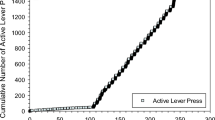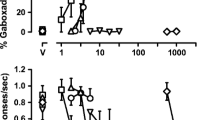Abstract
Behavioral effects of (+)MK-801 (0.03–0.32 mg/kg) and (−)MK-801 (0.32–3.20 mg/kg) were evaluated in rats using a multiple fixed-ratio, fixed-interval (FR20, FI2) schedule of food presentation. Both enantiomers produced dose-dependent decreases in response rate under the FR20 and in this respect (+)MK-801 was approximately ten times as potent as (−)MK-801. Under the FI2 schedule component, the (+) enantiomer produced substantial increases as well as decreases in response rate whereas the (−) enantiomer produced only decreases. When 0.178 mg/kg (+)MK-801 and 1.78 mg/kg (−)MK-801 were administered for 11 consecutive days, tolerance developed to the decrease in response rate under the FR20 schedule component. Tolerance to the effects of the (+) enantiomer under the FI2 schedule component was indicated by progressively larger increases in response rate than those observed during acute administration. These results support potential therapeutic applications of MK-801.
Similar content being viewed by others
References
Balster RL, Chait LD (1978) The behavioral effects of phencyclidine in animals. In: Petersen RC, Stillman RC (eds) Phencyclidine (PCP) Abuse: an appraisal. NIDA Research Monograph 21, Washington DC, pp 53–65
Benvenga MJ, Spaulding TC (1988) Amnesic effect of the novel anticonvulsant MK-801. Pharmacol Biochem Behav 30:205–207
Brady KT, Balster RL, May EL (1982) Stereoisomers of N-Allylnormetazocine: phencyclidine-like behavioral effects in squirrel monkeys and rats. Science 215:178–180
Clineschmidt BV, Martin, GE, Bunting PR (1982) Anticonvulsant activity of (+)-5-methyl-10,11-dihydro-5H-dibenzo (a,d) cyclohepten-5,10-imine (MK801), a substance with potent anticonvulsant, central sympathomimetic, and apparant anxiolytic properties. Drug Dev Res 2:123–134
Faden AI, Lemke M, Simon RP, Noble LJ (1988) N-Methyl-d-aspartate antagonist MK801 improves outcome following traumatic spinal cord injury in rats: behavioral, anatomic, and neurochemical studies. J Neurotrauma 5:33–45
Foster AC, Wong EHF (1987) The novel anticonvulsant MK-801 binds to the activated state of the N-methyl-d-aspartate receptor in rat brain. Br J Pharmacol 91:403–409
Genovese RF, Lu X-CM, Yourick DL (1990) Assessment of DSIP using schedule-controlled behavior in rats. Soc Neurosci Abstr 16:1054
Heale V, Harley C (1990) MK-801 and AP5 impair acquisition but not retention, of the Morris milk maze. Pharmacol Biochem Behav 36:145–149
Koek W, Colpaert FC (1990) Selective blockade of N-methyl-d-aspartate (NMDA)-induced convulsions by NMDA antagonists and putative glycine antagonists: relationship with phencyclidine-like behavioral effects. J Pharmacol Exp Ther 252:349–357
Koek W, Woods JH, Winger GD (1988) MK-801, a proposed noncompetitive antagonist of excitatory amino acid neurotransmission, produces phencyclidine-like behavioral effects in pigeons, rats and rhesus monkeys. J Pharmacol Exp Ther 245:969–974
Martinez-Arizala A, Rigamonti, DD, Long, JB, Kraimer, JM, Holaday, JW (1990) Effects of NMDA receptor antagonists following spinal ischemia in the rabbit. Exp Neurol 108:232–240
McDonald JW, Roeser NF, Silverstein FS, Johnston MV (1989) Quantitative assessment of neuroprotection against NMDA-induced brain injury. Exp Neurol 106:289–296
McLamb RL, Williams LR, Nanry KP, Wilson, WA, Tilson, HA (1990) MK-801 Impedes the acquisition of a spatial memory task in rats. Pharmacol Biochem Behav 37:41–45
Ment LR, Stewart WB, Petroff, OAC, Duncan CC, Montoya D (1989) Beagle puppy model of perinatal asphxia: blockade of excitatory neurotransmitters. Pediatr Neurol 5:281–286
Morelli M, Chiara GD (1990) Stereospecific blockade of N-methyl-d-aspartate transmission by MK801 prevents priming of SKF 38393-induced turning. Psychopharmacology 101:287–288
Olney JW, Labruyere J, Price MT (1989) Pathological changes induced in cerbrocortical neurons by phencyclidine and related drugs. Science 244:1360–1362
Papagapiou MP, Auer, RN (1990) Regional neuroprotective effects of the NMDA receptor antagonist MK-801 (dizocilpine) in Hypoglycemic brain damage. J Cereb Blood Flow Metab 10:270–276
Slifer BL, Balster RL (1983) Reinforcing propedrties of stereoisomers of the putative sigma agonists N-allynormetazocine and cyclazocine in rhesus monkeys. J Pharmacol Exp Ther 225:522–528
Slifer BL, Balster RL (1985) Phencyclidine-like discriminative stimulus properties of the stereoisomers of dioxadrol. Subst Alcohol Actions/Misuse 5:273–280
Tricklebank MD, Singh L, Oles RJ, Preston C, Iversen SD (1989) The behavioural effects of MK-801: a comparison with antagonists acting non-competitively and competitively at the NMDA receptor. Eur J Pharmacol 167:127–135
Ward L, Mason SE, Abraham WC (1990) Effects of the NMDA antagonists CPP and MK801 on radial arm maze performance in rats. Pharmacol Biochem Behav 35:785–790
Whishaw IQ, Auer RN (1989) Immediate and long-lasting effects of MK801 on motor activity, spatial navigation in a swimming pool and EEG in the rat. Psychopharmacology 98:500–507
Wong EHF, Kemp JA, Priestley T, Knight AR, Woodruff GN, Iversen LL (1986) The anticonvulsant MK-801 is a potent N-methyl-d-aspartate antagonist. Proc Natl Acad Sci USA 83d:7104–7108
Wong EHF, Woodruff GN (1986) The identification of a novel binding site for the anticonvulsant, MK-801, in rat brain membranes. Br J Pharmacol Suppl 89:536 p
Woodruff GN, Foster AC, Kemp GJ, Wong EHF, Iversen LL (1987) The interaction between MK-801 and receptors for N-methyl-d-aspartate: functional consequences. Neuropharmacology 26:903–909
Wozniak DF, Olney JW, Kettinger III L, Price M, Miller JP (1990) Behavioral effects of MK-801 in the rat. Psychopharmacology 101:47–56
Author information
Authors and Affiliations
Additional information
In conducting the research described in this report, the investigators adhere to the “Guide for the Care and Use of Laboratory Animals”, as promulgated by the Committee on Care and Use of Laboratory Animals of the Institute of Laboratory Animal Resources, National Research Council. The views of the authors do not purport to reflect the position of the Department of the Army or the Department of Defense (para 4–3, AR 360–5).
Rights and permissions
About this article
Cite this article
Genovese, R.F., Lu, XC.M. Effects of MK-801 stereoisomers on schedule-controlled behavior in rats. Psychopharmacology 105, 477–480 (1991). https://doi.org/10.1007/BF02244366
Received:
Revised:
Issue Date:
DOI: https://doi.org/10.1007/BF02244366




